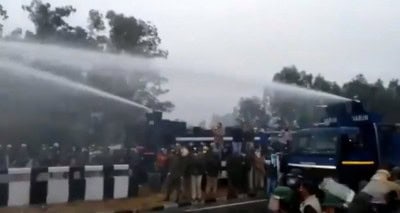Chandigarh, Nov 26 : Tens of thousands of farmers on Thursday practically rose up in arms as they braved tear-gas shells and water cannons, managed to break police barricades ahead of the Punjab-Haryana border in Shambhu near Ambala. Several protesters and policemen were injured.
The farmers broke barricades threw them down the bridge.
According to the All India Kisan Sabha, there are over 50,000 farmers at the spot.
Bracing overnight rains and chilly winds, thousands of protesting farmers have assembled at various places along the Haryana-Punjab borders amid mounting tension.
They have been stopped by the Haryana Police while heading towards the national capital for their ‘Delhi Chalo’ protest against the three Central Farm Laws.
A huge contingent of police comprising the Rapid Action Force has been deployed to deal with any untoward situation. They tried to evict farmers gathered since Wednesday evening.
Residents of several towns located along the Punjab-Haryana borders faced a harrowing time due to the heavy deployment of the security forces and snapping of the bus services in the past 24 hours.
Farmers have swarmed roads and other open spaces. Several link roads entering Haryana have also been barricaded.
Unfazed by the heavy security deployment and barricading on the highway with mounds of earth and huge rocks, a protesting farmer Gurdev Singh told the media at the Shambhu border near Ambala city, “We will break all the barricades if we were not allowed to move ahead.”
Farmers said they were ready to face even the bullets.
Section 144 of the CrPC has been imposed and the entire borders have been turned into a fortress.
A day earlier, farmers had major scuffles with the Haryana Police which failed to stop them from proceeding further despite heavy deployment of men and use of water cannons.
The major scuffle between the farmers and the police broke out at the Shambhu border on the national highway when the farmers broke the blockades and managed to proceed to Delhi for staging a demonstration.
Despite the use of water cannons, the protesting farmers, comprising men and women — both young and old — and school and college students riding tractor-trailers, cars and motorcycles, managed to enter Haryana from Punjab.
They were later joined by thousands of their counterparts from Haryana, led by Bharatiya Kisan Union (BKU) state chief Gurnam Singh Charuni.
As they reached Kurukshetra district, the local farmers joined them.
“The police must release our activists and vehicles. We will march towards Delhi, breaking the barricades,” Charuni said.
The police had taken nearly 100 farmer leaders from Haryana into “preventive custody”.
As per the police estimates, around 3,00,000 farmers from both the states are set to reach Delhi as part of their ‘Delhi Chalo’ agitation.
The farmers affiliated to 33 organisations are part of the United Farmers Front, an all-India body of over 470 farmers’ unions that will participate in the indefinite protest in the national capital from November 26.
The protesting farmers have threatened to block all the roads leading to Delhi if they are denied the permission to travel towards the national capital.
Barred from entering Haryana, the leaders of farmers’ organisations announced that they will sit on ‘dharna’ at the Dabwali barrier between Bathinda and Sirsa districts for a week.
BKU (Ugrahan) President Joginder Ugrahan said, “If we are not allowed to cross Haryana and head towards Delhi on Thursday, our protest destination will be the border points for a week.”
The Delhi Police has already asked the farmers not to enter Delhi as they don’t have permission to protest in the city.
The Haryana Police too have issued a travel advisory, asking commuters to avoid certain national highways along the state borders with Punjab and Delhi in the wake of the protests.
The main focus points of the protesters originating from within Haryana will be the four major national highways leading towards Delhi, i.e., Ambala to Delhi, Hisar to Delhi, Rewari to Delhi and Palwal to Delhi.
Farmers protesting against the farm laws have expressed apprehension that these laws would pave the way for the dismantling of the minimum support price system, leaving them at the ‘mercy’ of big corporate entities.
Disclaimer: This story is auto-generated from IANS service.

